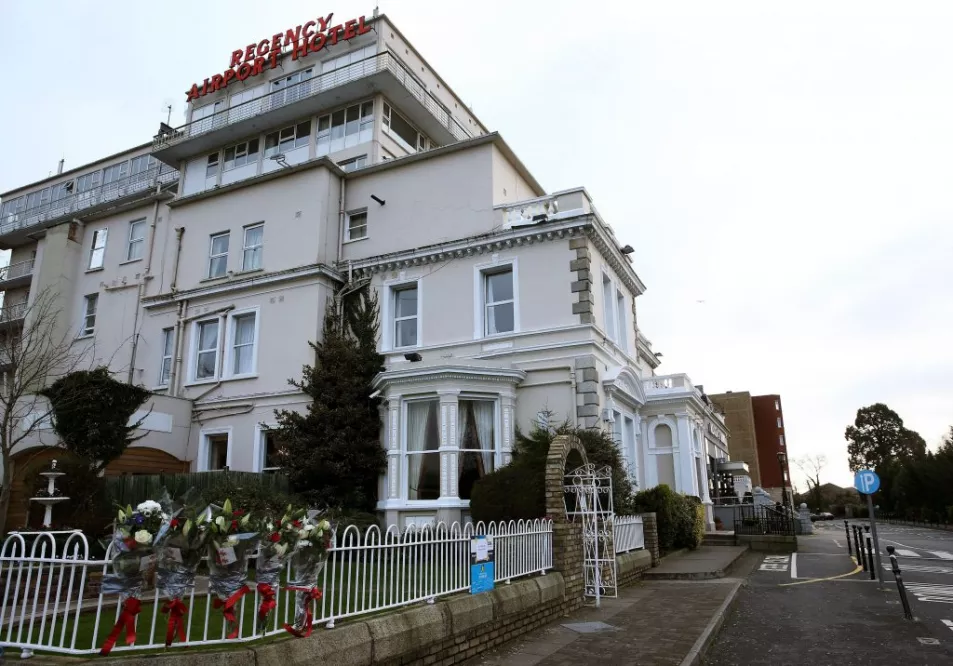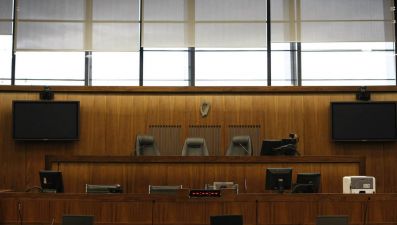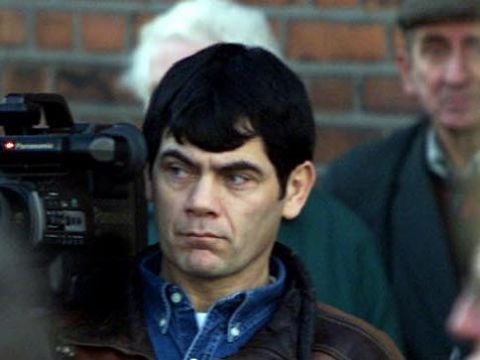Lawyers for Gerard 'The Monk' Hutch, who is accused of the murder of Kinahan gang member David Byrne at the Regency Hotel in 2016, have argued that their client will be discriminated against and receive unequal treatment if prevented from bringing an application before the Special Criminal Court to dismiss the charge against him.
Defence counsel Brendan Grehan SC, for Mr Hutch, told the non-jury court, that it would be an "extraordinary situation" and an "absurd interpretation" of Section 4E of the Criminal Procedure Act of 1967 if the Director of Public Prosecutions (DPP) could deny his client "the obvious benefit" of bringing the application simply because he was charged in the Special Criminal Court and not the District Court.
Mr Hutch (59), who is in custody, was present in court for Friday's hearing, where he sported a full mane of grey hair and a thick grey beard. He wore a white open necked shirt and beige chinos.
The three-judge court heard submissions from Mr Grehan, for Mr Hutch, and Michael O'Higgins SC, for co-accused and former Sinn Féin Councillor Jonathan Dowdall regarding Section 4E of the Criminal Procedure Act of 1967. Fiona Murphy SC made submissions for the prosecution.
Mr Hutch's four co-accused supported the Section 4E application and were present in court.
Section 4E states that a court can dismiss the charges against an accused person before trial where there is insufficient evidence.

Regency Hotel
On September 29th, 2021, Mr Hutch appeared before an out-of-hours sitting of the non-jury Special Criminal Court charged with the murder of Kinahan gang member David Byrne at the Regency Hotel on the Swords Road, Whitehall, Dublin 9, on February 5, 2016.
On Friday, Mr Grehan told the court that Mr Hutch's solicitors had served a notice of motion pursuant to Section 4E of the Criminal Procedure Act 1967 asking the court to dismiss the murder charge because there was not sufficient evidence to try him.
However, the barrister said that an issue arose on a literal reading of Section 4E which would appear to preclude Mr Hutch from making such an application because the section states that anytime after an accused is "sent forward for trial from the District Court" he may apply to dismiss the charge against him.
Mr Grehan added: "Mr Hutch was not returned for trial before the Special Criminal Court, he was charged directly before this court".
The barrister said a direction was given by the DPP in Mr Hutch's case whereby a warrant was sought for his arrest, which was granted by the Special Criminal Court on which the accused was brought before the three-judge court.
District Court
Equally, Mr Grehan said, a number of possibilities could have arisen including that Mr Hutch could have been charged before the District Court and sent forward for trial to the Special Criminal Court. The accused could also have been charged before the District Court and returned for trial to the Central Criminal Court at which point a direction could have been made ex-parte to have the matter transferred to the Special Criminal Court, he continued. In either of these situations the accused can clearly bring a Section 4E application.
The lawyer said Mr Hutch would receive unequal treatment before the law and effectively be discriminated against if he was inhibited from bringing an application before the Special Criminal Court to dismiss the charge against him. This would lead to "plain inequality of treatment" under the law between two categories of accused persons without any justification, he said.
Mr Grehan stated that there should be no reason in law that any distinction should be drawn between his client and those originally charged in the District Court.
"There is nothing in the legislation as to why Mr Hutch [or people in his position] should be treated differently than others nor is there any suggestion that the DPP in directing the accused to be brought before the Special Criminal Court was to prevent him having access to a Section 4E application," he said.
Literal interpretation
Mr Grehan submitted that a literal interpretation of Section 4E could not be correct and asked the non-jury court to look at the true meaning of the section by adopting the purposive approach as it afforded an accused person the opportunity to have the charges against them dismissed.
"Unless there is a justifiable distinction to be drawn, a person should not be treated differently simply because of where they are originally charged and to do so would result in not only unequal treatment but discriminatory treatment without any basis for it," he stated.
The only right Mr Hutch asserts was the right to make the Section 4E application like anyone else and an interpretation which disentitles him from making that application would be an absurd interpretation, he argued.
In summary, Mr Grehan said the plain intention of the Oireachtas in enacting Section 4E was not to discriminate and "unjustly treat" those charged in the Special Criminal Court.
If the Special Criminal Court adopted a literal interpretation of Section 4E then it would give the DPP "carte blanche" to deprive any accused of "this right simply by the expedient of having" them charged before the three-judge court, he concluded.

Senior counsel Michael O'Higgins, defending Jonathan Dowdall, said that those who drafted the legislation "inadvertently took their eye off the ball" and created circumstances nobody intended to.
Mr O'Higgins referenced the case of convicted ISIS member Lisa Smith, who was able to bring a failed application to dismiss charges before the non-jury court because she was fortuitously charged in the District Court.
"One group is fish and another fowl purely on how the case is administered and this is as arbitrary a premise as one could construe," submitted Mr O'Higgins.
In reply, Fiona Murphy SC, for the State, said the non-jury court did not have jurisdiction to hear the issue on a literal reading of Section 4E and there was no reason for the court to go behind the meaning of the section.
Ms Justice Tara Burns, presiding, sitting with Judge Sarah Berkeley and Judge Marie Keane, will rule on the application on July 15th.
In April 2021, former Sinn Féin councillor Jonathan Dowdall (44), with an address at Navan Road, Cabra, Dublin 7 was charged at the non-jury court with the murder of Mr Byrne at the hotel.
His father Patrick Dowdall (64), also of the Navan Road, is accused of participating in or contributing to activity intending to or being reckless as to whether his actions could facilitate the murder of David Byrne. The indictment alleges that he made a room available at the hotel for a criminal organisation or its members on February 4, 2016.
Paul Murphy (59), of Cherry Avenue, Swords, Co Dublin and Jason Bonney (50), of Drumnigh Wood, Portmarnock, Dublin 13 are both charged with participating in or contributing to activity intending to or being reckless as to whether such participation or contribution could facilitate the commission of a serious offence by a criminal organisation or any of its members, to wit the murder of David Byrne, by providing access to individual motor vehicles to that criminal organisation or its members, within the State on February 5, 2016.
All of the accused are due to stand trial at the Special Criminal Court on October 3rd next. If the trial goes ahead, it is expected to last 12 weeks.
David Byrne (34), from Crumlin, was shot dead at the hotel on the Swords Road in Dublin in February 2016 after five men, three disguised as armed gardaí, stormed the building, which was hosting a boxing weigh-in at the time.
Mr Hutch was extradited from Spain after his final appeal against extradition to Ireland was rejected by a Spanish Appeals Court on September 14th. He was being held in a Madrid prison.

Mr Hutch has been in custody since being arrested in a restaurant in Fuengirola on the Costa del Sol in Spain on August 12, 2021 by the Guardia Civil. A search for him began in April 2021 after Ireland issued a European Arrest Warrant in connection with the attack on the Regency Hotel.
Mr Hutch, of The Paddocks, Clontarf, Dublin 3, is the third man to be charged with the murder of David Byrne at the Regency Hotel.
Separately, the Supreme Court reserved its decision earlier this week after hearing appeals by Mr Hutch and Jonathan Dowdall against the DPP's decision to try them before the non-jury Special Criminal Court.
They argued that the Special Criminal Court was operating as a permanent court when it was set up on a temporary basis 50 years ago. Their challenge was dismissed by the High Court and the Supreme Court agreed to hear a leapfrog appeal, bypassing the normal Court of Appeal process as it raised issues of exceptional public importance and the trial date of October 3rd was imminent.







